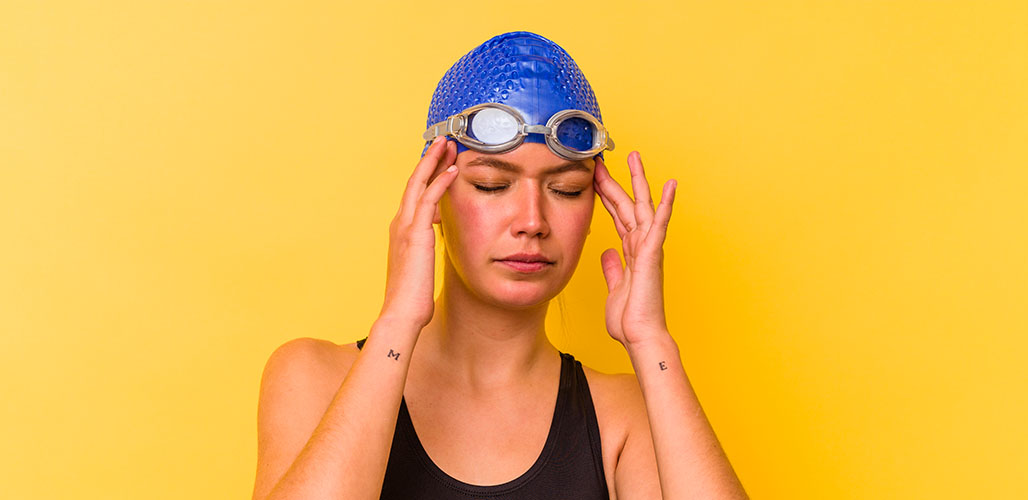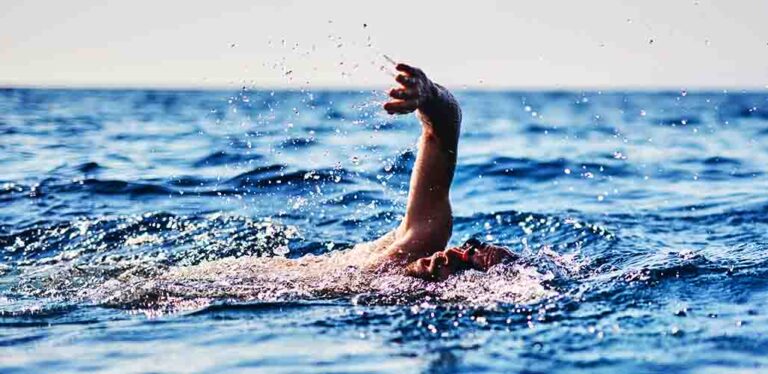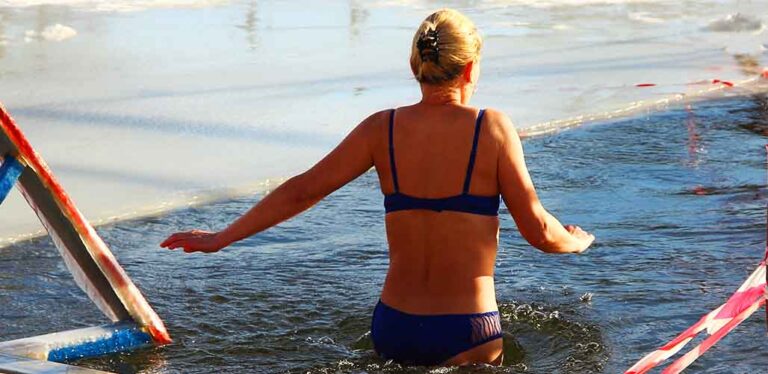Why Does Swimming Give Me a Headache?
Why does swimming give me a headache? Swimming is my favorite pastime; it has everything I need to keep in shape to look good and feel great. There are so many health benefits from swimming. While you tone your muscles and build strength and endurance, you are also making your heart and lungs strong. It really is the complete workout. But, while I know that swimming is so good for you, there is one question that bothers me. Why does swimming give me a headache? Headaches while swimming can be caused by a variety of factors. Some of the most frequent swimming-related headaches include compression, migraines, and sinus headaches. In this article, I will explain why some swimmers experience headaches at the pool and how to avoid this happening to you. Read on to find out more!
Contents
- Why does swimming give me a headache?
- Headaches caused by compression
- Prevent headaches by investing in a good pair of goggles
- Is your swim cap too small?
- Sinus problems
- The pressure of diving
- Swimmer’s ear
- Other causes for swimming-related headaches
Why Does Swimming Give Me a Headache?
While swimming is so positive for your health, people who frequent the pool are often left holding their heads. Headaches are relatively common in this fabulous pastime. A more experienced swimmer will tell you that the reasons for headaches at the pool vary. Swimming can trigger a migraine. Your headache could be sinus related or caused by wearing a swim cap or goggles too tight. Let’s dive a little deeper to find out more about each of these individual causes.
Headaches Caused by Compression
In most cases, like this one, it’s not swimming itself that gives you a headache. This kind of headache results from external pressure applied to the forehead. Simply put, it’s the effect of wearing goggles or your swim cap too tight. How long this kind of headache lasts is up to you.
By simply removing your swim equipment and adjusting accordingly, your headache shouldn’t last too long. However, prolonged pressure may transform the headache into a migraine if you don’t realize that your swim equipment is the problem.
It is essential to check your kid’s swim cap and goggles too. Please ensure they are the perfect fit, or your child may not enjoy their swim session as much as they should.

Prevent Headaches by Investing in a Good Pair of Goggles
If you are a competitive swimmer who uses regular racing goggles, you should either reduce the time you wear them or loosen the strap. If loosening the strap is not ideal for you, search for goggles with other strap designs. Ensure that the pair you select does not leak and is comfy for your head. If you are a competitive swimmer who uses regular racing goggles, you should either reduce the time you wear them or loosen the strap.
You should also check out goggles that cover a broader area surrounding the eye socket and rest just below the eyebrows. This kind has a bigger soft rubber seal that assists in relieving strain around the eyes and forehead.
Is Your Swim Cap Too Small?
You may need to invest in a new swim cap. Check if your current cap is too small. Otherwise, give your head a rest from time to time by removing your swim cap. Some short breaks should release any pressure that may have built up.
Sinus Problems
This kind of headache is most common after swimming. When viruses and other germs enter the nasal cavity, they cause inflammation. Swimming in chlorinated water is a typical cause of sinus inflammation. Additionally, diving raises the risk of sinus headaches owing to pressure shifts underwater.
The Saline Solution!
Ease sinus headaches by lowering nasal cavity irritation and congestion. Saline and salt-water spray will clean the nasal passages while flushing away unpleasant pool chemicals like chlorine.
Try a Nose Clip
Nose clips prevent chlorinated water from entering the nostrils, but they should only be used occasionally. While swimming, both nostrils and your mouth should be free to breathe. Unless you have repeated sinus issues, put your nose clip away for a while.
The Pressure of Diving
To prevent clogged sinuses, keep yourself protected from changing water pressure levels. As you go deeper in the pool, pressure changes, which may be a problem for your sinus issues. If you dive, try to limit your dives while experiencing sinus problems. Try to concentrate on other aspects of your training. If you must dive, talk to your pharmacist or doctor. Some over-the-counter medications you can pack with your swim gear may help.
Swimmer’s Ear is a Real Problem
Swimmer’s ear is an ear infection caused by water trapped in the ear. Trapped water creates bacteria, which are released into the outer ear canal. Aside from headaches, Swimmer’s Ear symptoms include itching, redness, swelling, soreness, and an unpleasant sensation of fluid in the ear. Unfortunately, antibiotic ear drops are required to treat an ear infection. Consult your doctor and get a prescription.
Prevention is always better than a cure, so you might purchase specialized swimming earplugs to prevent water from being caught in your ear. Or you could apply a water-resistant coating, such as Earol Swim Oil.
Other Reasons for Swimmer-Related Headaches
Other reasons that might cause swimming-related headaches include:
- Dehydration
- Incorrect breathing
- And over-exertion.
Drink water the night before and the day before swimming to avoid dehydration. Keep a water bottle beside the pool to take sips during your workout. Breathing problems produce a shortage of oxygen in the brain, causing the head to throb in discomfort. Ask a swim instructor to assist you in correcting your breathing technique. Listen to your body. Overtraining will lead to exhaustion, and you are sure to experience headaches as a result. If your body is reacting negatively, try to cut down on your time in the pool.
In Summary: Why Does Swimming Give Me a Headache?
Whether you swim for fun, to stay fit, or to compete, your body can react negatively for various reasons. You may experience headaches as a result. The simplest reason you or your child may need to realize is that your goggles or swim cap are too tight. This causes compression around the forehead and can result in continuous head pain. Try to loosen your goggles or buy a new swim cap. Take your cap and goggles off now and again, and give your head a break.
Sinus problems are also common in swimming. Swimming in chlorinated water is a typical cause of sinus inflammation. Saline and salt-water spray will clean the nasal passages while flushing away unpleasant pool chemicals like chlorine. If you experience sinus problems often, it might be time to invest in a nose clip.
Solving Other Problems When Swimming
- Leg pain during swimming
- Wrist pain during swimming
- Arm pain during swimming
- How lane choice can make you swim faster
- Tiredness after swimming
References
- Hindiyeh, N. (et al), ‘Does Exercise Make Migraines Worse and Tension Type Headaches Better?’, Current Pain and Headache Reports (2013)
- Darling, M. ‘The Use of Exercise as a Method of Aborting Migraine’, Headache (1991)
- Nagle, J. ‘What Happens to Your Body When You Swim’, The Rosen Publishing Group, Inc. (2009)
- Shoemaker, L. (et al), ‘Swimming-Related Effects on Cerebrovascular and Cognitive Function’, The Journal of Physiology (2019)



